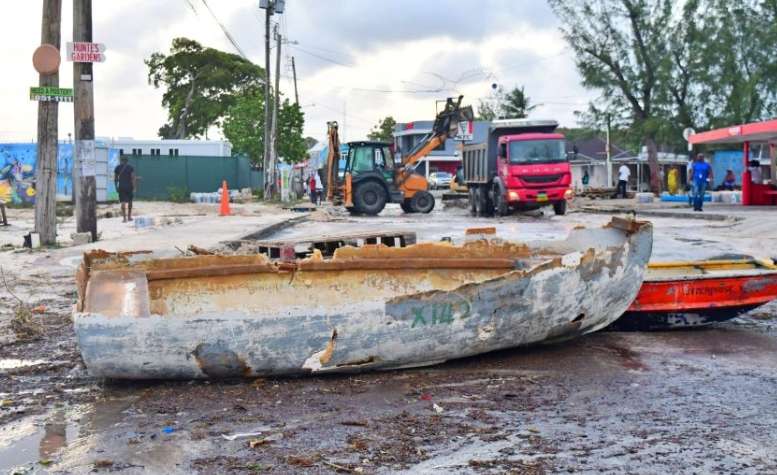Distant Hurricane Severely Impacts Barbadian Fisheries
The wrath of Hurricane Beryl, a Category 4 behemoth, spared Barbados a direct hit in July 2024, its eye passing nearly 100 miles away from the island nation. Yet, the island was far from unscathed. While mercifully no lives were lost, the storm’s far-reaching tendrils wreaked havoc on Barbados’ fishing industry, a vital sector of the nation’s economy and a cornerstone of its cultural heritage. The devastation left in Beryl’s wake was profound and far-reaching, impacting hundreds of families and sending ripples through the broader economy.
The most striking image of Beryl’s impact rests in the battered remnants of Barbados’ fishing fleet. Approximately 90% of the nation’s fishing vessels – the lifeblood of the industry – were either damaged or completely destroyed. Oistins, in Christ Church, bore the brunt of the storm’s fury, the once-vibrant fishing hub transformed into a graveyard of broken dreams and shattered livelihoods. A temporary boatyard in Bridgetown became a poignant testament to the scale of destruction, filled with rows of crippled boats awaiting an uncertain future. Some bore gaping holes, testaments to the raw power of the storm surge. Others had snapped rudders or shattered windows, symbols of the fragility of human endeavors in the face of nature’s might. Many more vessels simply vanished beneath the waves, leaving families with no means of income and a profound sense of loss.
The statistics paint a grim picture of the hurricane’s impact: 75% of the active fishing fleet damaged, 88 boats completely obliterated. Charles Carter, a fisherman whose livelihood revolved around his boat, the “Joyce,” epitomizes the struggles faced by many. He invested months of his time and thousands of dollars, painstakingly rebuilding his vessel, a testament to his resilience and the deep-seated connection between the fishermen and their boats. Others, like Captain Euride, used starker language, describing the industry as “mash up,” a vivid expression of the despair and uncertainty that gripped the fishing community. The challenge of rebuilding was not merely about replacing boats; it was about rebuilding lives and rekindling hope.
Six months after the storm, the recovery process is ongoing, but the path forward is fraught with challenges. While some boats have returned to the sea, the long-term sustainability of the fishing industry is threatened by a more insidious and pervasive force: climate change. Dr. Shelly Ann Cox, the Chief Fisheries Officer, points to the worrying trend of warming sea temperatures and altered currents. These changes are disrupting the delicate balance of the marine ecosystem, making it harder to catch flying fish, a national symbol of Barbados and a crucial component of the island’s diet and economy. While fish is still available in the markets, dwindling supplies are casting a long shadow over the tourism sector and the restaurant industry, two vital cogs in Barbados’ economic engine.
Fishermen like Cornelius Carrington, who lost his boat to Beryl, have witnessed these environmental shifts firsthand. “The whole pattern has changed,” he observes, noting the rising sea temperatures and unusual storm trajectories. His concerns extend beyond the immediate impact on his livelihood; he worries about the broader implications for the island’s economy and the fragile environment that sustains it. The experience with Beryl has underscored the vulnerability of the fishing industry to the unpredictable forces of a changing climate, raising fundamental questions about its long-term viability and the need for adaptation strategies.
Compounding the difficulties faced by the fishing community is the stark reality that approximately 90% of the 209 fishing boats affected by Hurricane Beryl lacked insurance coverage. This lack of financial protection against such catastrophic events has left many boat owners in dire straits, struggling to rebuild their lives and livelihoods. In the absence of insurance, the burden of recovery has fallen heavily on the shoulders of individual fishermen and their families, as well as on the government. This situation highlights the critical need for accessible and affordable insurance options for small-scale fishing operations, particularly in vulnerable island nations like Barbados facing the escalating risks of climate change.
Recognizing the gravity of the situation, the Barbados government has stepped in to provide much-needed support to the beleaguered fishing community. A multifaceted approach has been adopted, focusing on immediate financial relief, long-term recovery, and building greater resilience within the industry. A Fisheries Benevolent Fund, seeded with a US$250,000 (BDS$500,000) donation from the Latin American Development Bank, provides critical immediate financial assistance to affected individuals and families. This initial injection of funds aims to address the most pressing needs and provide a lifeline for those struggling to cope with the aftermath of the storm. A Business Interruption Benefit has been extended to include those who were not up-to-date with their National Insurance Contributions, expanding the safety net and ensuring that a wider range of individuals receive support. This inclusive approach recognizes the realities of informal employment within the fishing sector and prioritizes the needs of those most vulnerable. Finally, a 30-year Revolving Fund has been established to facilitate the repair and replacement of fishing vessels. The government grants, covering up to 25% of the costs, are designed to encourage rebuilding and enhance the long-term resilience of the fishing industry. This long-term investment underscores the government’s commitment to supporting the fishing community and recognizing its vital role in the national economy and cultural fabric. In addition to these measures, the Ministry of Environment and National Beautification, Green and Blue Economy has actively encouraged affected boat owners to apply for a fishing vessel repairs rebate, further bolstering the recovery efforts. These combined efforts aim to not only restore the fishing fleet but also to empower the fishing community to adapt to the challenges of a changing climate and build a more secure and sustainable future.
Share this content:












Post Comment